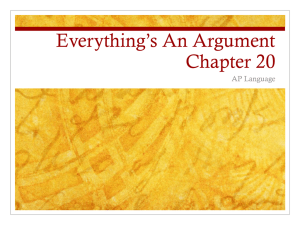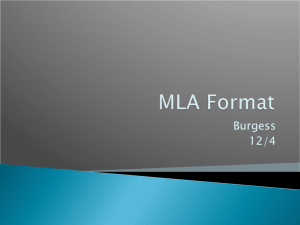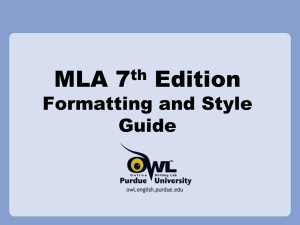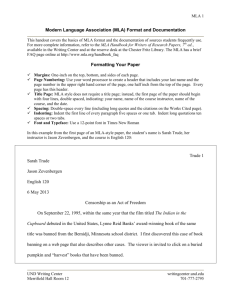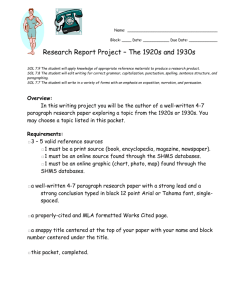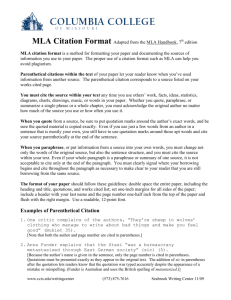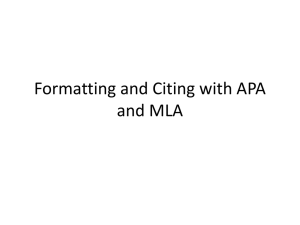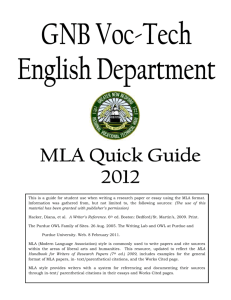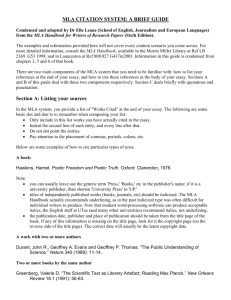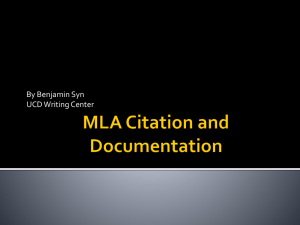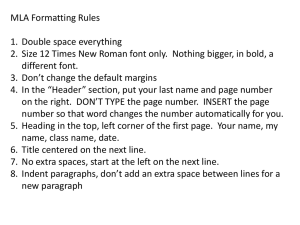MLA (more detailed presentation)
advertisement
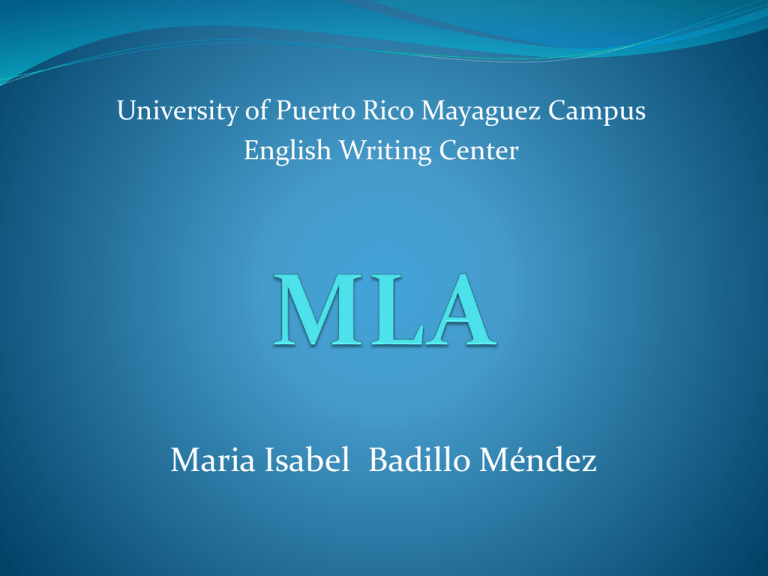
University of Puerto Rico Mayaguez Campus English Writing Center Maria Isabel Badillo Méndez What is MLA? MLA stands for Modern Language Association The MLA documentation uses “brief parenthetical citations in the text” that are reference of a text in the “alphabetical list of works cited that appears at the end of the work” (Modern Language Association). These parenthetical citations allow proper credit to be given to a person’s ideas as well as reinforce the writer’s argument. Who uses MLA and Why? MLA style is used in the Humanities. It is especially used “in writing on Language and Literature” (Modern Language Association). Why use the MLA style: Avoid plagiarism Builds credibility for the writer by providing sources. It is simple to use and organizes your paper coherently. Basic Format All writing must be in a basic and understandable font. The one that is recommended and usually requested by professors is Times New Roman 12. The alignment is left. Do not justify the paper. Margins are one inch from all sides. Indentation is half an inch from the margin. Page numbers are written plain and placed in the upper left corner; Last name page number (Gomez 1) First Page MLA doesn’t use a cover page. The information that would be presented in a cover page are placed in the left corner of the first page: Your Name (Juan Lopez) Professor and their last name (Professor Gomez) Full course name and number (English 3201) day Month year (8 May 2010) The title is in the center and it is in plain text. ( not italicized, underlined or bold) Example Parenthetical Citation These are used to attribute the original writing when you summarize, paraphrase and or quote. 1 In MLA these consist of a open parenthesis [ ( ], the author’s last name [Austen] the page number, line number, or act [1] and closed parenthesis [)] “It is a truth universally acknowledged, that a single man in possession of a good fortune, must be in want of a wife” (Austen 1). Other Parenthetical In-text Citation Prose: Author’s last name and page number “It is a truth universally acknowledged, that a single man in possession of a good fortune, must be in want of a wife” ( Austen 1). Poetry: Author’s last name and line number “I have been happy- and I love the theme: / Dreams! in their vivid coloring of life” (Poe 28-29). Plays: Author’s last name, act number, scene number and line number (if it’s written in verse) or page number (if it’s written in prose) “O Romeo, Romeo! wherefore art thou Romeo?” (Shakespeare 2.2.35) Parenthetical Citations When there are more than one work by the same author being cited one must provide a shorten version of the title. For example Adventures of Huckleberry Finn would be shorten to Huck Finn. This is accepted because the reader would still have a clear idea. The parenthetical citation then would be: “ The Widow Douglas she took me for her son, and allowed she would sivilize me; but it was rough living in the house all the time”(Twain Huck Finn 2). In-Text Citation Blended Are when the text is smaller than three lines of text. The quotation is joined to the structure of a sentence in quotation marks . During the nineteenth century it was acknowledged that “a single man in possession of a good fortune, must be in want of a wife” ( Austen 1). Blended quotations in Poetry A solidus (/) is use to separate lines. The speaker of “Annabel Lee” declares that “ the moon never beams without bringing me dreams / Of the beautiful Annabel Lee” (Poe 34-35). Block quotations Block Are when the text is more than four lines. These are set apart from the paragraph and indented one inch from the left margin. They are not put in quotation marks. Example: The narrator of “The Tell-Tale Heart” confesses that: It is impossible to say how first the idea entered my brain, but, once conceived, it haunted me day and night. Object there was none. Passion there was none. I loved the old man. He had never wronged me. He had never given me insult. For his gold I had no desire. I think it was his eye!(Poe 303) Quotation Marks vs. Italics • Quotation marks are used in titles of short or minor works: Songs Short Stories Essays Short Poems One Act Plays Titles of sections from longer works Articles in newspapers, magazines, or journals • Italics are use for long works that consist of smaller sections Novel Multi-act Play CD’s T.V. Series Movies Newspapers Magazines or journals Works Cited Page Basic Rules: The Works Cited page goes on a separate page at the end of the paper. Entries must be of texts cited and/or referenced in your main text. Label the page Works Cited if you are only listing the works cited. Label Works Cited and Consulted if you include all the works you have referenced List Alphabetically Double space, but do not skip spaces between entries. Indent, half an inch, the second and fallowing lines of citations creating a hanging indent. Works Cited Page The Medium of Publication, form, must be provided. Example: Print, Web and etc. URLs for Web entries are optional and depend on the professors preference. Most months are abbreviated: January - Jan. February - Feb. March - Mar. April - Apr. May - May June - June November - Nov. July - July December - Dec. August - Aug. September - Sept. October - Oct. Common Works Cited Book: Author’s last name, First name. Title of Book. Place of Publication: Publisher, Year of Publication. Medium of Publication. Austen, Jane. Pride and Prejudice. New York; Penguin, 2005. Print. When there are more than one work by the same author one will use ---. Austen, Jane. Emma. New York: Barnes and Nobles Classic, 2004. Print. ---. Pride and Prejudice. New York; Penguin, 2005. Print. Publications on the Web: Editor, author, or compiler name (if available). “Name of Webpage (if applicable).” Name of Site. Version number. Name of institution/organization affiliated with the site (sponsor or publisher), date of resource creation (if available). Medium of publication (Web). Date of access. Example of a Webpage on a Website: Russell, Tony, Allen Brizee, and Elizabeth Angeli. "MLA Formatting and Style Guide." ThePurdue OWL. Purdue U Writing Lab, 4 Apr. 2010. Web. 8 Mar. 2011. Note: If the date of publication is not available use n.d. If a publisher or sponsor is not available use n.p. Work in an Anthology or Reference Book: An anthology is a compilation of text arranged by an editor. A reference book is a group of concise entries. Example: Dictionary, Atlas, Encyclopedia and etc. Author’s last name, First name. "Title of Essay." Title of Anthology. Ed. Editor's Name(s). Place of Publication: Publisher, Year. Page range of entry. Medium of Publication. Poe, Edgar A. “The Tale-Tell Heart.” The Collected Tales and Poems of Edgar Allan Poe. New York: Modern Library, 1992. 303-306. Print. Recorded Films or Movies Title. Dir. Name of director. Perf. Name of main performers. the distributor, the release year. Medium.(DVD, VHS, laserdisc). Inception. Dir. Christopher Nolan. Perf. Leonardo DiCaprio, Kent Watanabe, Joseph Gordon-Levitt, Marion Cotillard, Tom Hardy, Ellen Page and Michael Caine. Warner Bros., 2010. DVD. Sound Recordings Generally, the artist name but it might begin with the composers (comp.) or performers (perf.). Otherwise, list composer and performer information after the album title. Song titles go in quotation marks and album names are italicized. Artist name or composer or performer. “song.” Album title. recording manufacturer, publication date (or n.d., if date is unknown). Medium. (e.g. CD, LP, Audiocassette). The Beatles. “Strawberry Fields Forever.” Love. Capitol Records, 20 Nov. 2006. CD. Translations: Official Translations: It is when the text used is a translation from the original. Author’s last name, First name. Trans. Translator’s name. Title of Book. Place of Publication: Publisher, Year of Publication. Medium of Publication. Sturluson, Snorri. Trans. Jesse Byock. The Prose Edda: Norse Mythology. New York: Penguin, 2005. Print. If you are citing the translators word choice or notes his name goes before the authors. Jesse Byock, trans. The Prose Edda: Norse Mythology. By SnorriSturluson. New York: Penguin, 2005. Print. Painting, Sculpture, or Photograph Artist's name. title of the artwork. the date of composition. (if the date is unknown, place n.d.).name of the institution that houses the artwork, the location of the institution. Van Gogh, Vincent. The Starry Night. 1889. Museum of Modern Art, New York. (If the work is cited on the web only: name of the artist, the title of the work, the medium of the work (Photograph etc.). then follow the citation format for a website.) Translations: Unofficial Translation: It is when the text used is in its original language and the person writing the essay makes their own translation. In these cases the translation is not recognized by MLA and the citation would be as if it were an ordinary book. MLA mandates that the original text should not be manipulated when citing. Any changes must be done trough brackets []. Therefore, if a person wishes to translate a section they can make a note with the translation or add the translation in brackets. Additional Reference For more information on Summarizing, Paraphrasing and/or Quoting view the “Quoting, Paraphrasing, and Summarizing” (Driscoll and Brizee) at OWL Purdue. Van Gogh, Vincent. The Starry Night. 1889. Museum of Modern Art, New York.
